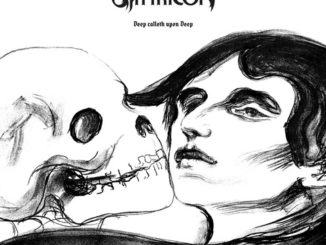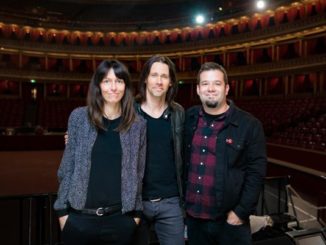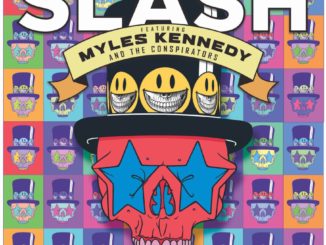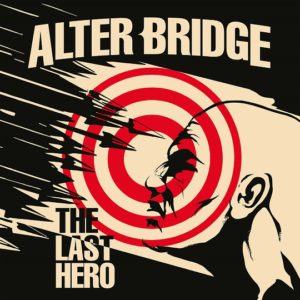
Alter Bridge have released their fifth studio album, The Last Hero, on October 7 through Napalm Records/Rocket. The Last Hero is the follow up to 2013’s critically acclaimed Fortress, which swept into album charts worldwide – including a #6 slot in the UK, #12 in the US (Billboard 200), #7 in Germany and #4 in Austria. The band worked with producer and longtime collaborator Michael ‘Elvis’ Baskette to craft the songs for The Last Hero.
Started in 2004 by Mark Tremonti and Scott Phillips, Myles Kennedy and Brian Marshall Alter Bridge are one of the premiere hard rock bands of today. Layered with bone-chilling vocals that rival powerhouses such as Layne Staley and Ronnie James Dio, the band showcases true versatility with sultry rock ballads and shredding metal riffs. Whether it be through relentless touring, chart-topping albums (their self-titled debut has been certified Gold) or even a WWE wrestler’s theme music, Alter Bridge are the true definition of rock and roll musicianship.
Alter Bridge release their latest offering in “The Last Hero”, continuing their signature rock sound and bringing their sense of melodies to the forefront. The album touches on the world as we know it today and it has been asked on whether it is conceptual.
Myles Kennedy: The Last Hero is not a concept-record but it does have a theme that runs throughout the record on a number of songs. And it deals with the concept of the hero and it looks at the need for heroes, the lack of heroes and that what we tend to do to our heroes and our leaders. And also there are songs that pay tribute to heroes and more everyday heroes people that serve the community or the country so it’s definitely a reoccurring theme on the record.
Some could say it’s a very political record with political statements.
Myles: As far as statements go I don’t know if we…the only statement that’s being made is that there’s a general sense of disillusionment. We don’t have an agenda and we definitely don’t have any desire to tell people what to choose or how to choose but there’s definitely a reflection on this record of how people seem to feel right now for whatever reason. And it’s not a reflection on the current Administration like that we have in our country – and some people misunderstood that it’s not that. But I think it’s just a very broad stroke about something that really has evolved at least in our country over the last 40 years. I mean it started with the Watergate scandal where people suddenly didn’t… started to re-question your leadership and you didn’t trust everything that came out of their mouths. Which is a real real harsh awakening waiting for us, in particular.
Seems like it’s just been getting even worse from Watergate on.
Myles: It seems like that dynamic is continued, yeah. You start finding things out about people not being honest and hiding things and this scandal happening with that person. And ya, it’s strange because when I was a kid I just assumed the people that were put positions of power were doing the right. And the thing that was best for the people and sometimes you wonder if that’s always the case. And it’s not to say that there aren’t people still with good intentions. But there are definitely those who are corrupt and have agendas that aren’t the best for the country.
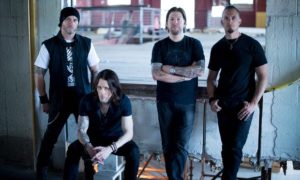
Alter Bridge has always worked to outdo their previous efforts in every aspect of their career. The same holds true for the newest video for their debut single ‘Show Me A Leader’ that was released in September. The video is based on a concept created by Alter Bridge and director Zev Deans that brings life to the story told in the single’s lyrics. The animated video shows the world in turmoil as politicians (represented by suits with megaphone heads) are broadcasting harmful messages to the public. The band is on a roof with a satellite dish performing ‘Show Me A Leader’ to counteract the harmful messages being spread.
The video is visually captivating and showcases Deans’ talent and unique creative style, something the band was immediately drawn to.
The apocalypse is a general topic in our society as well on ‘The Last Hero’. But mankind has already been talking about it for centuries!
Myles: Sure. That’s been going on for a long time. It’s interesting that humans for assuming thousands of years thought that they were the last batch. And that’s kind of telling, I guess, about human nature and in general. Maybe we tend to look at the glass being half empty as it’s supposed to be half full. But it certainly seems to be a common thing, you know. It’s been going on for a long time. People prophesying about end times and are worrying about to how we…the new thing obviously is the environment and how that’s changing and will that affect humanity and so yeah…it’s complex.
It took 3 years to release ‘The Last Hero’?
Myles: 3 years – a lot happened in between. After we did the tour cycle for Fortress then I went back in and made a record with the Slash & The Conspirators and we toured pretty extensively there. Mark did another Tremonti record… or records if I’m not mistaken. And toured. And so I think in the last six years what’s happened is that we’ve… everybody had… And Scott Phillips also has his Projected. He’s playing with a friend of ours John Connelly from me from a band called Sevendust which is an awesome band. So yeah everybody’s – I guess staying out there, you know. It is no real down time which I don’t know if any of us realized how that was going to affect things. And it seems to be affecting things for… in a good way. Because I think when you constantly stay out on the road and constantly make records, you – number 1: you kind of keep your chops up and you keep your game intact and by staying out there people don’t forget about it ’cause it we live in a time where people’s attention-span is pretty short. They have a lot of entertainment options. And so I guess it lets people know that you’re in it for the long haul and that you aren’t going to make a record disappear on them. And if they can jump on board and support what you do then you’re going to continue to be there for them. So it’s all good.
When did you decided to start writing songs for Alter Bridge again after spending time in your solo projects?
Myles: Mark and I started discussing at middle of last year when we would reconvene and essentially get together and put our ideas together and married the parts. So December was what we were shooting for it so we started Skype sessions. Because I live in Spokane which is, you know, all the way across the country from where they live. And so we put together – I think – 6 rough outlines of some songs to bring in. Once I actually got to Orlando and we can start arranging as a group and you have something to kind of start from. So what would happen is I showed up in early January mid-January and we started ironing out the songs with the rhythm section. And then we go back to Mark’s house at night and then work more putting these new ideas together. So it was kind of like 18 hour days for Mark and I through the process for a couple months there. A lot of work. But good work. Fun work. Anyway I think we start recording it’s kind of a blur at this point I want to say March or April or something like that but it was a 6 months total, 6 months process.
18-hour-days? Easy for the youngsters over a certain period of time, but definitely difficult for people over 40.
Myles: Exactly! You are absolutely right! As the years go on and you realize you have a finite amount of time on the planet and you want to use your time wisely. So I think that’s part of the reason we do it that way because if you go back to 10 years ago we were putting Blackbird together it was a pretty long drawn-out process. And what we discovered is it if we do a record and stay very focused and just hit it hard for a very specific period of time it’s kinda like cramming for a test the day before and sometimes you land on your feet sometimes you don’t. Fortunately because of the process we have we seem to have a really good filtration system but between the four of us and also with her producer Elvis. That we get the outcome that we want in the short amount of time that we that we allow ourselves. So yeah you’re right putting in 18-hour days at this point in life it isn’t always easy but it seems to work for us and you know. And we just drink a lot of coffee and we survive.
Soundwave Festival Perth 2012
‘My Champion’ climbs from a swell of delay into an impressive guitar lick before Myles delivers one of the most spirited choruses of their career to date. “The lyric was actually inspired by thinking back to my situation as a kid,” he remembers. “I was this really small, underdeveloped kid who had to work extremely hard to keep up with all of my peers. It was very frustrating. I would hear a lot of words of encouragement from parents, coaches, or teachers though. A lot of those things were stored away, and they manifested themselves in this song. I’ve been able to apply some of those concepts in my life a thousand times over since then.”
And after these exhausting times are you off on a long holidays?
Myles: Holidays? What’s a holiday? I haven’t had a real holiday… I don’t even remember the last time I had a holiday…you know I seem to remember we finished up and then I’m just off doing something. We just…we work. What else is there to do? We sitting on a beach somewhere with a Martini – that seems boring.
When was it clear in terms of knowing what the album would be about? When you met Mark or later?
Myles: It wasn’t clear initially but it became clear I think when ‘Show Me Leader’ – Mark actually had that hook, here that part music – What do you think it is? And I thought it was great!And then I remember I was thinking about that song as we had the music put together and try to think of where to go with the lyric and I remember hearing the TV in the other room and it was a campaign coverage and I never think of myself now there’s still another Messiah here tonight but we’re all way to numb and divided to buy it. And I wrote that down and then it just came really quickly. And I think that’s when the whole concept of ‘The Last Hero’ started was at that point.
How’s the composing process for you both?
Myles: Composing usually starts with just sitting around with the guitar and just see what happens. You just kind of let an idea evolve and you try not to force it and try not to overthink it and kind of turn off that part of your brain where it it stifles the creative aspect. And generally what I do and I think Mark does the same thing: I’ll record it. A real raw version. Nothing don’t spend a ton of time you’re tracking with Pro Tools or Logic or whatever. I just put it on my phone and then step away from it. And so then I go back and listen to it fresh, kind of a fresh perspective and it’s that the idea that I came up with a few days ago or maybe I really set it aside for weeks or months – how does that resonate with me now. Because then you would have the ability to listen to it like a listener would listen to it, like with a fresh perspective. And the thing about songwriting and music in particular this is just weird primal thing you don’t understand why a certain melody will connect you more than other melodies or certain riff will connect with you more. It just does. And you rely on that internal part of your psyche that can help you filter through that. Then what I tend to do it so I’ll bring those out and say he what you guys think of this is? And Mark does the same thing. He’ll bring what he thinks are his better ideas. But the interesting thing about that is it sometimes that you’re wrong. And sometimes there’ll be a part that you thought wasn’t anything exceptional and then you play it for your partner. And they’re like: wait a minute – you’re on to something. And so that’s the hardest part. Especially when you’re relatively prolific as a creative person. Cos then you have so many ideas know to wait through. So you really have to put the time in and just playing on how you’re ego hurt as you’re playing all these ideas to your friends.
What’s it like playing all these ideas to some people? Do some of them make fun of it, when you’re under the impression that they are not that good?
Myles: Sure! Oh yeah it was funny is when I play the intro for ‘Show Me A Leader’ our drummer Scott totally started making fun of me. He was like man you sound like you’re it’s… like you’re in a Spanish bull-fight. And he was like: I see you with like a red cape and he was totally making fun of me but interestingly enough everybody else loved it. I think he still thinks that part is funny. But it started the entire record. So you never know.
So you’re a very democratic band?
Myles: It’s pretty democratic. It’s definitely… you know Mark and I are the primary songwriters. But we definitely listen to Scott and Brian and Elvis as far as what they’re reacting to. In fact we really have come to rely on that democracy. If it was a dictatorship and Mark and I were like OK guys these are the songs and you gotta play them I think we would be very different sounding bad. Because Mark and I left to our own devices would probably pick different moments to integrate into the records. So we really have come to rely on the team and that Rock’n’Roll democracy that we’ve built with Alter Bridge.
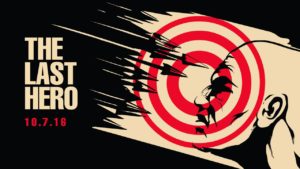
What happens when Mark & you like a song and the others (incl. producer “Elvis”) are against it?
Myles: Yeah I mean that’s hard and that happens, man. There are songs where… There was a song called -phew- which song was that? Where people will just want to driving with it. It was a song called ‘Crows On A Wire’ and there was some concern in the camp if that wasn’t up to Snuff, as they say. But Mark and I sometimes have the benefit co we know where the song is going to be at the end of the day. We can kind of hear it done in our heads. So we were like essentially say you know: trust us on this one. This will turn out all right. And often times when that happens they’ll beg ya you were right. But sometimes, you know, a song after we’ll finish it people are like: yeah it’s not my favorite track. But people I think have learned, myself included, Mark included, you’ll leave your ego at the door when you’ll step into the studio and start working.. The goal should be to make the best songs possible. And it shouldn’t be about whether or not it was your part or whoever’s part it is. And it shouldn’t about whether or not you made the call or not. It should be about, you know, what is everybody feeling. And really just you learned… it’s the politics of songwriting, essentially.
Michael Baskette alias “Elvis” has produced the new album again, as well as previous ones before. You love him, right?
Myles: Michael Baskette – we feel very fortunate to make these records with him. And he’s a rare breed anymore and that he’s a true producer in the sense that he, you know, he understands song-arrangements, he understands how to get great performances, he understands how to get incredible sounds. So he can do it all. And some producers are either good song guys are they’re good engineers, mixers. And he’s both. So it’s kind of like you get more bang for your buck. And you also get some sort of a comedian. Because when you’re in the studio with him and he’s really funny. He keeps the whole process fun. And people won’t get all angry and worked up and stressed out and so he helps us make better records.
It’s a bit of a dilemma, isn’t it? On the one hand a band wants creative development; on the other they want to stay recognizable and not to put off fans.
Myles: Sure. I mean I think to a point you’re trying to a) keep your fans happy, b) keep yourself interested. and c) not repeat yourself too much and show some sort of evolution. But all the evolutions becoming more subtle I think for record record with us cuz I feel like by the time we got to ‘Fortress’ we really found what we were about as a band. And from ‘Fortress’ to ‘The Last Hero’ sure there’s definitely some like you’re talking about, you know, the integration of seven string or new tuning or whatever. But that’s not…I don’t know if that’s a big enough change to show that you really trying something new, you know. If we had a song or we’ve suddenly went into like a jazz Odyssey-ride in the trunk of that would be… that’s a pretty extreme change. But it’s a real delicate dance. Because you really don’t want to alienate your fanbase, the people who love you for what you already are just to get your musical Rocks off. And they are fans we’ve discovered over the years that give us license to make these long epic songs. They really seem to like that. And there some fanbases they’re like we want you to make three minute pop songs with a very simple formula. But our fans like it when we stretch things. And we’re lucky for that.
Alter Bridge is blessed with two stunning guitarists! Is there competition for who’s going to play which solo?
Myles: Actually never. It’s really great because Mark and I feel that both of us have different skill sets that complement each other. And like with Mark he’s so great at coming up with these very heavy unique riffs that are very unique to what he does. So a lot of times he plays a riff than I come over the part, he comes over the top of that…Like ‘Crows On The Wire’ is a good example. I’m coming back to that song. Like he had that initial riff and I put this kind of counter-melody over the top of that and… What’s interesting was that Elvis, the producer initially wasn’t really sure about this song. But then once the countermelody came in he was like: Aww, okay – I see where this is going and I see what you guys are doing here. And if I bring in a riff or bring in a musical piece it’s totally different than what he does. Like a good example would be a song called ‘This Side Of Fate’ which he brought in the verse and chorus and it’s really cool trippy thing and then I brought in this middle-section which is people who keep comparing it to like Queen or Muse. And so it’s a very different and yet acompliments the other part. And so generally for somebody brings in another part they play a lot of it on the record. And then the other guy will add his special sauce over the top of it. So it really depends on the track.
Quick question: Mark also did the singing on the last record. What about ‘The Last Hero’? Is he singing on this as well?
Myles: Just backup vocals. Yeah. I would have loved for him to have sung on this record. But I think he put out the 2 Tremonti-records – and there are three now, I believe. And so I guess Elvis felt like it would be appropriate to have me go and see the leads on all the tracks on this one. Yeah that’s how it worked out.
Back on track: So no inconsistencies, right. But is there some kind of competition somehow?
Myles: I think that we’ve just realized that we each do different things. There’s probably a little bit of friendly competition as far as…and when it comes to laying down leads, you know, you don’t want to lay down a lead that’s like sucky and the other guy – in the same song – but sometimes that’s like WOW that’s amazing! So it really, it helps, I think it helps everybody ultimately to play better. Which is a good thing.
And you’ve composed and noted down every single note of every guitar solo on the record?
Myles: Yeah – which I usually not do. And Mark’s been doing that on every record. But I’ve always been more of an improviser because I come from somewhat of a jazz background. That was what I, you know, learned to do. But on this record because the lyrics came so easily usually I’m behind the curve when we were working in the studio and I’m trying to, you know, to get tracking it during the day. And when I get home at 9 I’m finishing lyrics because we cut the vocals later. But this time, though because the lyrics are written so quickly I had weeks of nothing to do when I get back to the studio. And so I was like you know what? One of the fans favorite solos is Blackbird of Blackbird record. And that’s a solo where I had it kind of planned out in the beginning, had an idea just an idea where I wanted to go. And I was like I’m going to do that with my solos on this record. And I think it worked out well. I’m really happy with the leads on this album.
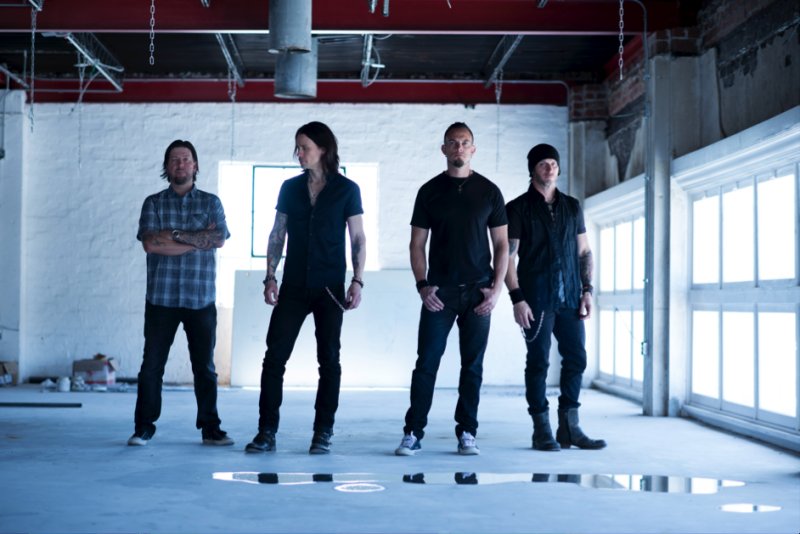
Alter Bridge burst onto the music scene in 2004 with the release of their gold-selling debut, One Day Remains. In 2007, the band released Blackbird, the album that elevated the band’s profile worldwide. The epic solo in the title track ‘Blackbird’ was voted ‘Greatest Guitar Solo Of All Time’ by Guitarist Magazine. ABIII was released in 2010 and the single ‘Isolation’ gave the band their first #1 single. In 2013, the band reached an elevated creative and critical plateau with ‘Fortress’. It bowed at #12 on the Billboard Top 200, moving over 30,000 copies first-week and earning unanimous tastemaker praise. The record garnered perfect scores from Total Guitar and KERRANG! as well as acclaim from Billboard, The Guardian, Loudwire, Ultimate Guitar, and many more.
In between sold out tours in Europe and North America, the guys appeared on VH1 and graced the cover of Classic Rock Magazine who labeled Fortress, ‘The best thing they’ve ever done,’ while Eddie Trunk called it, ‘A top 10 album of the last 10 years.’ Alter Bridge has appeared on The Tonight Show and Jimmy Kimmel Live and their music has been used by the WWE, Major League Baseball and NASCAR to name a few.
There’s also this story about the Blackbird-Solo. People say it is the best in the world!
Myles: There’s a guitar magazine a few years ago that had a readers poll. And the readers – at least a certain faction of readers – voted ‘Blackbird’ is the greatest solo of all time. Which I don’t necessarily agree with. I mean it’s subjective I don’t think there’s a greatest of anything when it comes to any sort of art-form. But for me my favorite guitar solo of all time is ‘comfortably numb’, man. That’s what really gets me off. But we were really honored that people enjoyed it enough to vote. That was pretty cool.
It’s striking that there are recollections of your previous albums on ‘The Last Hero’.
Myles: Yeah I think the last … Elvis actually made this comment when we’re tracking, he was like: the interesting thing is that there are elements from previous records. You got songs that remind me of something you’ve done on ‘Blackbird’. You have songs that remind me of something on ‘ABIII’ and ‘Fortress’. But the same time you’ve things you’ve never done before. So it’s been kind of a nice way to sum up the whole thing with showing some evolution.
And what exactly, have you created on ‘The Last Hero’ for the very first time?
Myles: I think the way we approach ‘This Side Of Fate’ because it takes such an about-face or such a left turn it when we hit the middle part of that song. And the way that ends up. That seemed pretty new to me as far as an arrangement approach. And pretty fun. So that be my road there.

